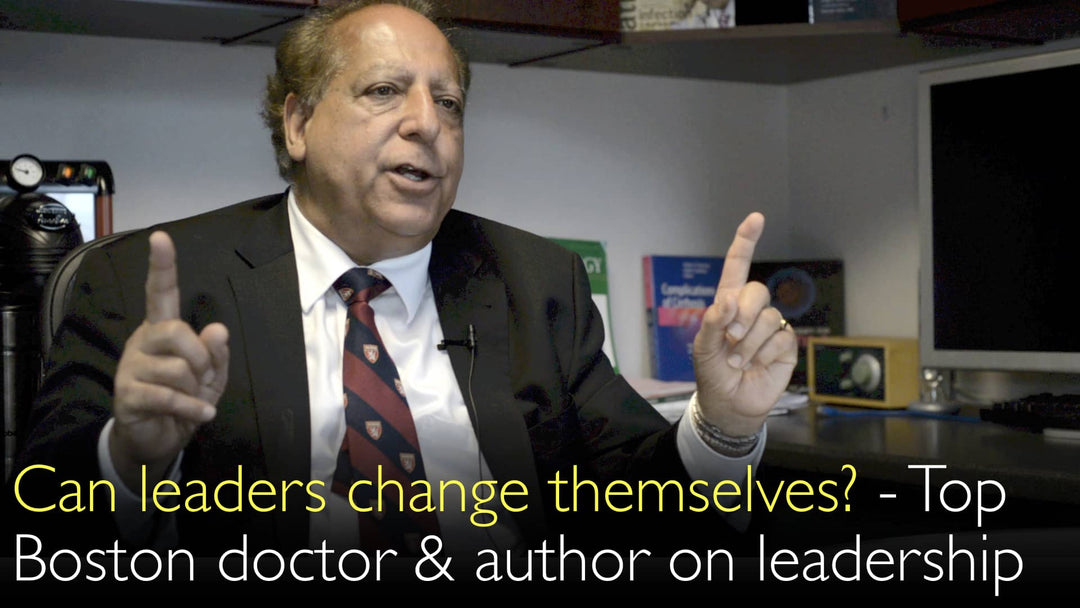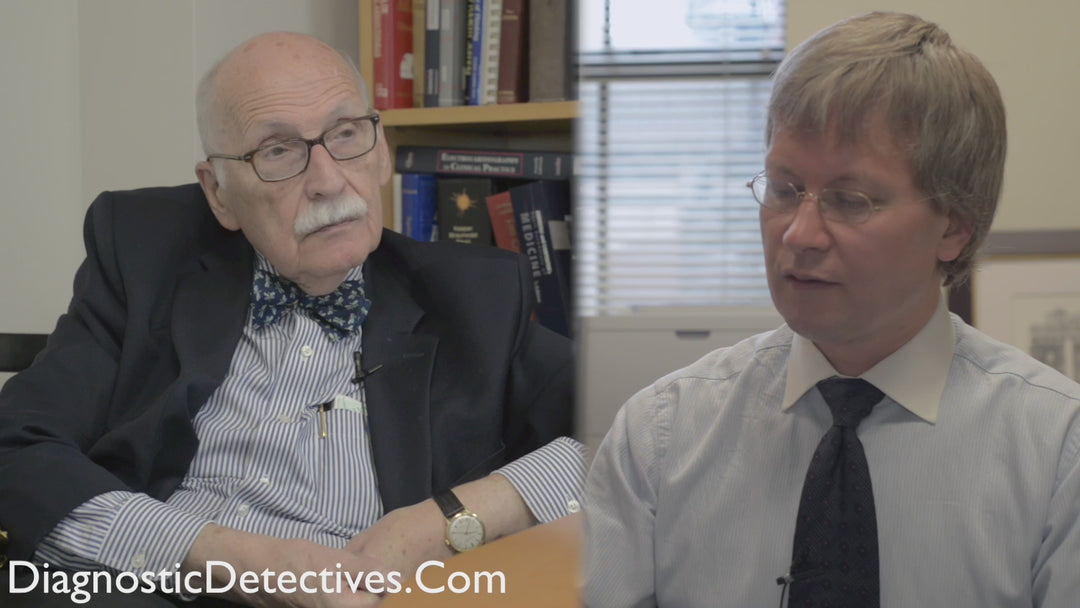Leading expert in leadership and medicine, Dr. Sanjiv Chopra, MD, explains how leadership is a dynamic quality that can be cultivated by anyone, not just those with a title. He details the core tenets of effective leadership, including listening and empathy, and emphasizes that true leaders lead by example, making themselves progressively redundant by empowering their followers to excel.
How to Cultivate True Leadership Qualities and Lead by Example
Jump To Section
- What is the True Definition of Leadership?
- Leadership Titles vs. Leadership Qualities
- The Critical Difference Between Leaders and Managers
- How Anyone Can Cultivate Leadership Skills
- Key Tenets of Leadership by Example
- The Gandhi Story: A Powerful Lesson in Leading by Example
What is the True Definition of Leadership?
Dr. Sanjiv Chopra, MD, provides a powerful definition of leadership during his discussion with Dr. Anton Titov, MD. He describes it as the ability to articulate a compelling vision and then walk the path in a way that inspires others. True leadership motivates people to rise above their daily challenges and work together to achieve a higher, common goal.
This concept moves beyond mere authority or position. It is about influence, inspiration, and creating a shared purpose that drives collective achievement.
Leadership Titles vs. Leadership Qualities
A critical distinction made by Dr. Sanjiv Chopra, MD, is that a formal title does not automatically confer leadership qualities. An individual can hold a high-ranking position like CEO, President, or Prime Minister yet still lack the essential attributes of a true leader.
Conversely, Dr. Sanjiv Chopra, MD, notes that one can be an amazing leader without ever having an official title. He defines a great leader as someone who makes themselves progressively redundant by empowering their followers to take over and ultimately do a better job.
The Critical Difference Between Leaders and Managers
In his conversation with Dr. Anton Titov, MD, Dr. Sanjiv Chopra, MD, highlights the important difference between management and leadership, citing management guru Peter Drucker. The famous adage is that "managers do things right, while leaders do the right things."
Dr. Chopra expands on this by sharing a perspective from Dipak Jain, a former Dean of the Kellogg School of Management. Jain summarized the difference succinctly: "Managers are for today, leaders are for tomorrow." This underscores the leader's role in having a compelling vision for the future and the ability to articulate it to their team.
How Anyone Can Cultivate Leadership Skills
A central theme from Dr. Sanjiv Chopra, MD, is that leadership is not a static quality one is necessarily born with. He asserts that everyone can cultivate the elements of leadership through deliberate practice and focus.
This dynamic view of leadership means that individuals and organizations can develop these skills over time. Dr. Chopra teaches that by focusing on specific tenets and practicing them consistently, anyone can become a more effective and inspiring leader.
Key Tenets of Leadership by Example
Dr. Sanjiv Chopra, MD, teaches that leadership is built on core tenets, which he outlines in his book and talks. He advises organizations to focus on one tenet at a time to build these skills collectively.
The first tenet is listening. A team might make it a goal for a week to become better listeners. The following week, the focus could shift to empathy, practicing more kindness and compassion with patients and colleagues. Dr. Chopra recommends holding brief meetings to share experiences, which helps to embed these qualities into the culture through lived example.
The Gandhi Story: A Powerful Lesson in Leading by Example
Dr. Sanjiv Chopra, MD, shares a profound story to illustrate the absolute necessity of leading by example. A mother traveled 40 miles to ask Gandhi to tell her son to stop eating sugar. Gandhi asked her to return in three weeks.
When they returned, Gandhi simply told the boy to stop eating sugar, and the boy agreed. The confused mother asked why he hadn't said that three weeks earlier. Gandhi whispered that, at that time, he himself had not yet given up sugar. This story, shared by Dr. Chopra with Dr. Anton Titov, MD, perfectly encapsulates that a leader must embody the change they wish to see before they can authentically ask it of others.
Full Transcript
Dr. Anton Titov, MD: The title does not bestow upon you leadership qualities. One can be an amazing leader without ever having a title. A great leader makes themselves progressively redundant. They make themselves useless and the followers take over and do a better job.
Dr. Anton Titov, MD: Professor Sanjiv Chopra, leadership. You wrote a best-selling book, "Leadership by Example." You gave, to wide acclaim, a lecture more than a hundred times around the world that is called "Leadership for the 21st Century: The Tenets of Leadership." You said that, "Great managers do things right. Great leaders do the right things," Peter Drucker.
But a great leader can also take the country backwards or take a business backwards, not necessarily forward. There are many examples where strong leaders ruin their businesses and even their countries.
Is leadership a static quality? Can leaders change where they lead to and how they lead? Can leaders change themselves? Or must you always change leaders to change the direction, be it a country or a business?
Dr. Sanjiv Chopra, MD: Terrific, great questions! I have always been fascinated by leaders and great leadership moments in history. We should first start by maybe defining leadership.
I would define leadership as the ability to articulate a vision and walk the path such that it inspires other people to rise above the banality and strife of their common day existence and achieve a higher and common goal.
The title "leader" does not bestow upon anyone leadership qualities. Somebody can be the CEO, they can be a Chancellor, they can be the Vice President, they can be the President, they can be a Senator, they can be a Congressman, they can be the Prime Minister. They can have all these amazing leadership titles, but they are not leaders.
The title does not bestow upon you leadership qualities. One can be an amazing leader without ever having a title, right? The definition of a great leader is somebody who makes himself or herself progressively redundant. They make themselves useless and the followers take over and do a better job.
Leadership is a fascinating topic; it is a very dynamic topic. It turns out that leaders are not necessarily born. Everyone can cultivate the elements of leadership.
In my book and in my talks, I talk about the ten tenets of leadership. The quote that you mentioned earlier: we need both managers and leaders. One can be an amazing manager but not a good leader. One can be a great leader and not a good manager.
This is Peter Drucker, the management guru. He said, "Managers do things right, leaders do the right things." I had a discussion with Dipak Jain, he is a legendary individual who was the Dean of the Kellogg School of Management in Illinois. It is one of the leading five MBA programs in the world. Once Time business magazine rated it to be a number one school in the world. Then he was also the Dean at INSEAD in Europe. This is also one of the leading 5-10 business schools in the world.
I asked Dipak, I said, "Dipak, what's the difference between managers and leaders?" He had a wonderful definition. He said: "Managers are for today, leaders are for tomorrow." They have a compelling vision of the future. They can articulate it and get their followers to achieve the goal and work together. Leader leads from behind.
We can cultivate leadership in many different ways. In my book I talk about the 10 tenets of leadership. When I give this talk at transplant centers, surgical Grand Rounds, medical Grand Rounds, radiology CEO clubs, I talk to different groups. People often say, "How can we incorporate this? What you have just taught us." I say, "Take one of the tenets, make it a goal in your company, make it a goal in your transplant center. That for the next week, you'll be a better listener. That is the first tenet of leadership by example. L is for listening."
Then at the end of a week share your experience. The following week: empathy. You are just going to be more kind and more compassionate. The following week have a little 10 minute meeting and discuss, how did it feel to be kinder to your patients, to the families. Then you will start to live it by example.
There's an amazing story of Gandhi, where this lady walks from a village about 40 miles with a twelve-year-old son and she says, "Gandhi-ji, my boy, my son eats too much sugar, he's gaining a lot of weight. Would you please tell him not to eat sugar, it is not good for him." Gandhi looks at the boy, looks at the mother. He says: "Come back in three weeks."
They go back to the village. Three weeks later they again march forty miles. They arrive and Gandhi looks at the boy and he says: "Son, don't eat sugar - it is not good for you, you are gaining too much weight". The boy says, "Gandhi-ji, from this moment I will stop eating sugar." He starts to leave the room. The mother stays behind and she says: "Gandhi-ji, thank you for saying that to my son. But can I ask you a question? We were here three weeks ago and you could have said the same thing to my son then!" Gandhi whispers into her ear: "At that time I had not given up sugar."
You have to lead by example! That's a fascinating story, it is remarkable!
Yeah, remarkable! But Gandhi led by example and that is what the great leaders do. In big questions and in small. Yes!







